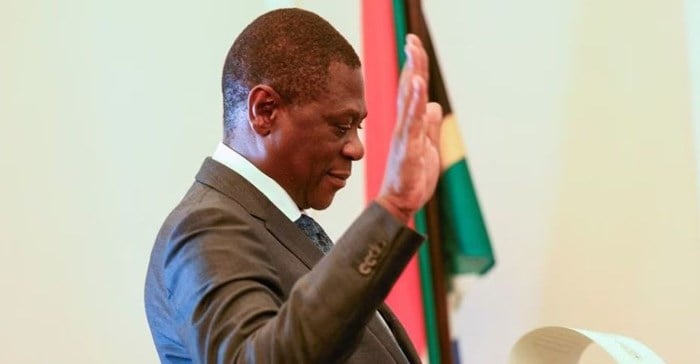
Related



#MiningIndaba: Placing safety at the core of SA's mining boom
Merel van der Lei 16 Feb 2026



G20: SA, EU sign "unprecedented agreement" on critical minerals
Tim Cocks 24 Nov 2025
Top stories






More news















The country too got long-awaited confirmation that Kgosientsho Ramokgopa is the new minister in the presidency responsible for electricity while Maropene Ramokgopa is the new minister in the presidency responsible for planning, monitoring and evaluation - two new ministries established by Ramaphosa to attend to the country's current challenges.
"The Minister for Electricity will deal with the immediate crisis of load shedding.and the second will focus greater attention on the performance of government and the full and urgent implementation of the Energy Action Plan," Ramaphosa said.
This, he said, will help to deal with the challenge of fragmentation of responsibility across various departments and ministers.
Congratulations on your new responsibility as COGTA Minister cde Nkadimeng. #cabinetreshuffle pic.twitter.com/d8IviAG4M1
— Goodman Pilusa (@Ke_GeeMan) March 6, 2023
The minister will be expected to facilitate the co-ordination of the numerous departments and entities involved in the crisis response, work with the Eskom leadership to turn around the performance of existing power stations, and accelerate the procurement of new generation capacity.
To enable the minister to do this work, Ramaphosa said he will, in terms of section 97 of the Constitution, transfer to them certain powers and functions contained in relevant legislation.
"In the State of the Nation Address, I announced that a national state of disaster had been declared to respond to the electricity crisis and its social and economic impact."
"The recently published disaster regulations empower the Minister of Electricity to issue directions to, among others, exclude critical facilities from load shedding where technically feasible; expedite various regulatory processes for energy projects; and enable Eskom to undertake critical maintenance more quickly and efficiently.
"The minister in the presidency for electricity will liaise with other relevant Ministers to ensure coherence in the issuing of other directions during the national state of disaster."
Finance Minister Enoch Godongwana, Mining and Energy Minister Gwede Mantashe and Public Enterprises Minister Pravin Gordhan, all seen as key Ramaphosa allies, retained their posts, as did the Minister of Police Bheki Cele. In contrast, after 22 years and leading eight government departments, Lindiwe Sisulu's tenure as a Cabinet member came to an end along with ministers Nathi Mthethwa and Maite Nkoana-Mashabane.
And just like that, Fikile Mbalula gets to walk away from the mess he left in the transport ministry. #cabinetreshuffle pic.twitter.com/4pbuJg9P7u
— Moqhaso�������� (@qhasi2) March 6, 2023
Eleven new ministers and nine new deputy ministers were appointed to the national executive. These included Khumbudzo Ntshavheni as the minister in the presidency; Nkosazana Dlamini Zuma as the minister in the presidency responsible for women, youth and persons with disabilities; Sindisiwe Chikunga as the minister of transport and Patricia de Lille as minister of tourism - a move which some political analysts have applauded given the greater representation of women at executive level.
Addressing his new Cabinet on Monday night, Ramaphosa said: "I expect them to fulfil their tasks with rigour and dedication, to adopt a zero tolerance approach to corruption wherever it exists, and to place the interests of the people of South Africa foremost in the work that they do."
All in all, the cabinet changes were not a surprise, critics have said, given the elections next year and Ramaphosa's intent to run for a second term in 2024.
But the downside has been the sheer size of the new Cabinet.
"I get the feeling that the president is juggling many balls in this 27-plus-two cabinet and then additional deputy ministers. The executive arm of government is larger that it's been in the last 10 years or so. In addition, people have been shifted around but I'm not convinced that we will necessarily see a radical change," says Angelo Fick, the director of research at the Auwal Socio-economic Research Institute.
"This is because the more people you have involved in government the less likely you are to get the services that the government is supposed to deliver."
No matter how much Cyril Ramaphosa tries to change their positions from one department to another, but in our eyes they'll remain losers who waste taxpayers money.
— Africa is Black ® ���� (@AfricaisBlack) March 6, 2023
#cabinetreshuffle. Patricia De Lille. Pravin. Fikile. Paul Mashatile. pic.twitter.com/Yulff4JICm
"These additional people might make it look like there are more people responsible, but doesn't that just split the responsibility among more people who might have to come to some sort of agreement? One imagines there's going to be conflict between the various ministries that are responsible for Eskom as a public enterprise, and energy production distribution [facility].
"It remains part of the minerals project because mining is so central to South Africa, but presumably the trading industry will have some kind of interest in this as will the minister of health who may want to have some input on this given our hospitals are affected by load shedding."
"In order to have the delivery of stable electricity Transnet has to be on board as part of this acquisition of interdepartmental co-operation because coal has to be moved. There's going to be quite a bit of negotiating with a range of stakeholders."
President Cyril Ramaphosa , by keeping Bheki Cele as Minister of Police, you make it more evident that you don't give a damn about the women and children in your country. #cabinetreshuffle #EndViolenceAgainstWomen
— Women For Change (@womenforchange5) March 6, 2023
And while Ramaphosa said that the Minister in the Presidency for Electricity will remain in office only for as long as it is necessary to resolve the electricity crisis, Fick countered this saying: "Unless the person does really well, he might be the minister of electricity in perpetuity as would the new additional members of the expanded cabinet.
"Once you have bloated the cabinet to 29 members it will more than likely stay that way."